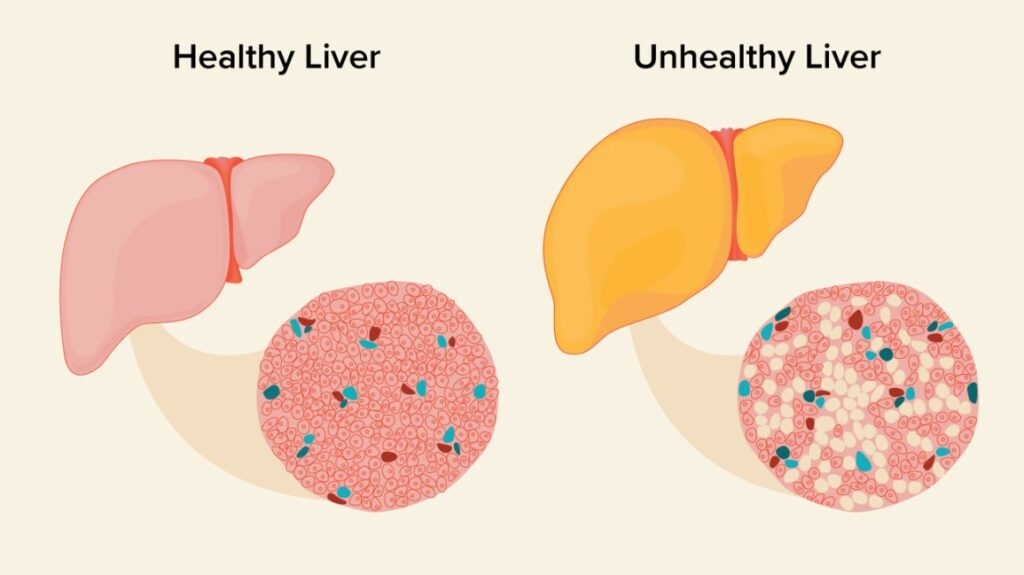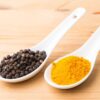Is Turmeric (Curcumin) Good For Your Liver Health?
- Posted on
 Taiba Tariq
Taiba Tariq- Categories: Turmeric Nutrition

The article will examine the role of turmeric for liver health. Hepa means liver, and toxin refers to the quality of being poisonous. At the same time, toxic hepatitis happens when your liver develops inflammation from exposure to poisonous and toxic substances.
Many global surveillance systems on the safety of plant products blamed hepatotoxicity linked to the consumption of food supplements containing powdered extract and Curcuma longa.
Only a few cases of hepatotoxicity, assessed using the Roussel Uclaf Causality Assessment Method (RUCAM) method, from prolonged intake of piperine and curcumin have been reported; it would be reasonable to hypothesize that the suspected toxicity of Curcuma longa could be due to the simultaneous presence of piperine (black pepper extract). Hence, the hepatotoxicity of Curcuma longa is baseless, and curcumin in turmeric is good for liver health.
Turmeric for liver health: Curcuma Longa is Hepatoprotective
Turmeric, scientifically perceived as Curcuma Longa, is a perennial herb that belongs to the Zingiberaceae family. The Food and Drug Administration (FDA) authority in the U.S. determined that curcumin in turmeric, the essential active compound, is generally safe owing to its antioxidant effects.
This natural polyphenol curcumin has been considered a “wonder drug of life.” Since ancient times, Curcuma longa has been used as hepatoprotective (liver-friendly) and for treating digestive tract problems.

THE LIVER
The chemical hub, the liver, is the largest solid organ in the body. It is believed to be found beneath the rib cage in the right upper abdomen. Its function is to remove toxins from the blood, maintain healthy blood sugar levels, regulate blood clotting, and perform hundreds of other vital functions.
How Effective is Turmeric Curcumin for Liver Health?
Curcumin’s antioxidant, anti-inflammatory, and wound-healing effects make it an ideal liver health supplement.
Research indicates that it has protective and therapeutic effects on oxidative-linked liver diseases in many ways:
- Curcumin suppresses the proinflammatory cytokines or the immune system cells.
- It reduces the levels of oxidative lipid breakdown.
- It also lowers levels of cellular responses to oxidative stress.
- All such effects show curcumin as a free radicle fighter protecting liver health.
Turmeric (curcumin) for Fatty Liver Diseases
As per research, curcumin has positive effects on treating non-alcoholic fatty liver disease (NAFLD). Study results show that higher dosages of curcumin of about 1000mg daily can help reduce blood-liver enzyme levels in 8-10 weeks of treatment. Here is how turmeric helps to maintain liver health.
NOTE: However, turmeric is not an alternative treatment, and the research on its use for fatty liver is inconclusive.
Other Remedies for fatty liver disease
Following lifestyle changes may help treat fatty liver disease. They include:
- maintaining a healthy Body Mass Index (BMI)
- consuming a healthy & balanced diet
- taking regular exercise
Evidence shows that people who lose as little as 3–5 percent of their body weight may improve their liver fat. Still, a person may need to lose up to 10 percent of their body weight to reduce liver inflammation.
Turmeric’s efficacy on detoxification:
A group of rats was exposed to mercury. During the 3-day treatment period, the rats were treated with curcumin, and they experienced a protective effect from mercury-induced oxidative stress.
Curcumin curbed hepatic oxidative stress suggesting that it may have therapeutic uses in the prevention and treatment of liver disease.
TURMERIC versus CURCUMIN FOR LIVER HEALTH:
Placebo-controlled trials and studies used turmeric instead of curcumin, which didn’t show developments in NAFLD severity compared to the placebo group. It suggests that curcumin could be a more critical supplement than turmeric. Curcumin also protects against heavy metals and toxins, such as lead, copper, arsenic, cadmium, and chromium poisoning. Turmeric can improve and repair liver health by maintaining antioxidant status, stabilizing mitochondrial function, and being a free radical fighter. While turmeric might have similar benefits in preventing non-alcoholic fatty liver disease (NAFLD), research does not support its use. Studies have assessed turmeric and curcumin for treating NAFLD, not prevention. However, maintaining a healthy body weight may prevent fatty liver diseases.
Safety &Dosage:
As turmeric is a supplement, not prescribed medicine, FDA didn’t make its dosing recommendations. Instead, supplement manufacturers recommend a range of doses — usually from 500–2,000 milligrams (mg) per day. Multiple studies also examine dosages in this range.
How to take turmeric for liver health?
It would be best to consider turmeric starting with a lower dose of a few hundred mg. Then you must notice increasing the amount weekly as long as you do not experience side effects. Curcumin is commonly considered safe for most people. However, if consumed in excessive amounts or for an extended period, it could cause digestive symptoms.
Always let your healthcare provider know you are thinking about taking curcumin to make sure it won’t interfere with any prescribed treatments you may already have.
Side Effects & Risks It May Have
The National Center for Complementary & Integrative Health states that turmeric supplements and creams are likely safe. Still, researchers are working to develop more concentrated, bioavailable forms of turmeric. Researchers do not know whether it is safe to use turmeric as a supplement in amounts more extensive than those found in food when pregnant or nursing. Very few studies have analyzed turmeric’s safety with other drugs. Until now, there is no clear-cut evidence of drug interactions and no evidence that it is safe. People using antibiotics, chemotherapy drugs, blood thinners, and other medications should talk to a doctor before taking supplements. Once in a while, turmeric and other supplements may damage the liver. A single study mentions two cases of turmeric-induced liver injury relative to low doses of turmeric.
Can turmeric have the potential to reverse liver damage?
Another research tested turmeric’s quality to cleanse and detox the liver in a group of rats with alcohol-induced liver damage. The treated rats overthrew almost all of the pathological effects of alcohol due to curcumin’s anti-inflammatory and antioxidant properties. Once more, the results showed the fantastic ability of curcumin to repair the liver and detoxify it.
Is Turmeric Good for Liver-Repairing & Detoxification?
Yes, it is possible to some extent.
Taiba Tariq
Taiba Tariq is a healthcare nutrition hobbyist, enthusiastic about researching healthcare & skincare news while analyzing the latest and science-backed evidence about nutrition, skin care, and supplements. She wants to help people regain their beauty, health, and well-being through natural means.
all author posts




